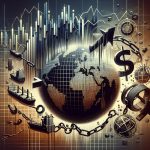President Donald Trump’s recent tariff announcements have caused significant turmoil in the U.S. stock market. The S&P 500 has fallen more than 13% since Trump won the election in November, with most of the losses occurring after his aggressive tariffs were announced on Wednesday. Trump shared a link on his Truth Social platform to a video claiming he is intentionally crashing the stock market.
The video, which contains several inaccuracies, attempts to explain Trump’s strategy behind the tariffs. The market reaction has been dramatic, with the S&P 500 index dropping 4.8% on Thursday—the worst plunge in nearly five years—followed by a 6% loss on Friday. According to the video, Trump’s aim is to force the Federal Reserve to lower interest rates and refinance a portion of the federal government’s $36 trillion debt.
Market turmoil after Trump tariffs
However, White House National Economic Council director Kevin Hassett stated on ABC’s “This Week” that a stock market crash is not part of an intentional strategy by President Trump. Hassett emphasized, “It is not a strategy for the markets to crash.”
The president’s retaliatory tariffs have created rising fears of a protracted global trade war and a recession.
The Dow Jones Industrial Average declined around 2,231 points, or 5.5%, on Friday alone—its largest drop since June 2020. The tech-heavy Nasdaq sank nearly 12% in the two days following the tariff rollout and fell into bear market territory. Trump directly called on the Fed to lower the target federal funds rate in a social media post on Friday.
However, Fed Chairman Jerome Powell responded, stating that the tariff increases will be significantly larger than expected, leading to higher inflation and slower growth. Addressing concerns about the economic implications, Hassett stated, “I don’t think you’re going to see a big effect on the consumer in the U.S.” Despite this, the evolving geopolitical scenario, combined with internal economic policies, continues to shape the nation and its global interactions.







